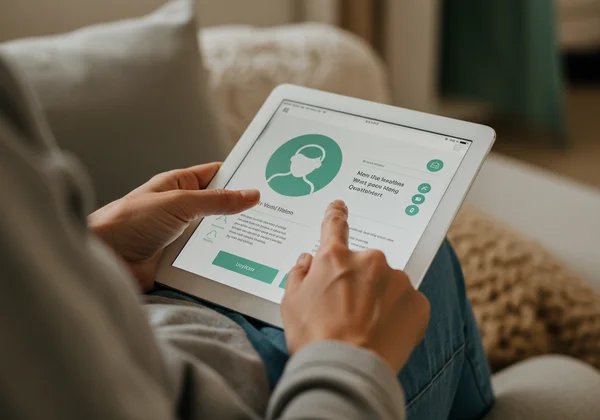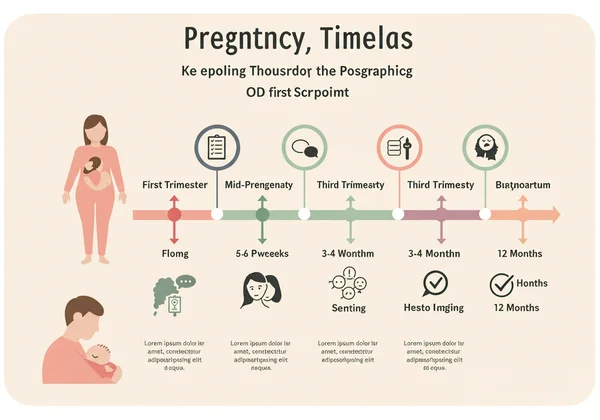When to Take the EPDS Test: Guide for New Parents
July 27, 2025 | By Clara Maxwell
Navigating the journey into parenthood is a profound experience, filled with moments of incredible joy and significant challenges. Amidst the physical changes and new responsibilities, your emotional well-being is paramount. Many new and expecting parents find themselves wondering about their mental health, asking a crucial question: When should EPDS screening be done? Understanding the right time to check in with your feelings is a powerful act of self-care. The Edinburgh Postnatal Depression Scale (EPDS) is a trusted tool designed to help you do just that.
The EPDS Test is a simple, confidential 10-question screening that helps identify symptoms of perinatal depression and anxiety. It’s not a diagnosis but a valuable first step toward understanding your emotional health. Taking control of your well-being starts with awareness, and knowing when to screen can make all the difference. You can get a clear, confidential insight into your feelings by taking a free EPDS screening today.

Why Timely EPDS Screening Matters for Parents
Timing is everything, especially when it comes to mental health. Proactive and timely epds screening isn't just about checking a box; it's about safeguarding your well-being during one of life's most transformative periods. Early identification of mood changes can significantly improve outcomes for both you and your baby, allowing you to access support before challenges become overwhelming. Think of it as preventative care for your emotional health.
Just as you attend regular check-ups for your physical health during pregnancy, monitoring your emotional state is equally vital. The perinatal period—spanning pregnancy and the first year after birth—involves immense hormonal, physical, and social shifts. These changes can make anyone vulnerable to mood disorders. By using an epds depression screen at key moments, you empower yourself to navigate this journey with confidence and support.
The Benefits of Early Identification for Perinatal Well-being
Catching potential issues early offers immense benefits. When symptoms of depression or anxiety are identified sooner, the path to feeling better is often shorter and more manageable. Early support can help prevent symptoms from escalating, reducing their impact on your daily life and your ability to bond with your baby.
Furthermore, addressing your mental health positively influences your entire family. A healthy parent is better equipped to create a nurturing environment for their child. Taking an edinburgh postnatal depression scale epds is a proactive step that fosters resilience, strengthens family connections, and sets a foundation for long-term perinatal well-being.

Proactive Mental Health Care: A Must for Expecting Parents
The concept of proactive mental health care is about shifting from a reactive to a preventative mindset. Don't wait until you're struggling to seek clarity. Screening during pregnancy allows you to establish a baseline of your emotional health. It helps you and your support network, including partners and healthcare providers, stay attuned to any changes that may arise.
This approach normalizes conversations about mental health and integrates it into routine perinatal care. It’s a declaration that your emotional wellness matters and deserves attention. Taking a few minutes for an online EPDS test is a simple, powerful way to prioritize yourself and your growing family.
Optimal Moments for EPDS Testing During Pregnancy & Postpartum
While you can check in with your mental health at any time, clinical experts recommend screening at specific intervals to ensure consistent monitoring. Understanding this perinatal mental health timing helps create a structured approach to your emotional care throughout pregnancy and the postpartum period.
Think of these as emotional checkpoints on your parenthood journey. Each one offers an opportunity to pause, reflect, and assess how you are truly feeling. This structured approach ensures that subtle changes don't go unnoticed and that you have a clear understanding of your emotional state over time.

Key Checkpoints for EPDS During Pregnancy
Pregnancy is a time of great anticipation, but it can also bring emotional ups and downs. Screening for antenatal depression is just as important as screening for postpartum depression. Recommended checkpoints include:
- First Trimester: During one of your initial prenatal visits to establish an emotional baseline.
- Mid-Pregnancy (24-28 weeks): As your body undergoes significant changes and the reality of parenthood sets in, this is a crucial time to check in.
- Third Trimester: In the final weeks before birth, anxiety and stress levels can rise. An epds questionnaire can help identify needs for support before the baby arrives.
Post-Birth: Recommended EPDS Timelines After Delivery
The postpartum period is famously demanding. Hormonal shifts, sleep deprivation, and the immense responsibility of caring for a newborn can take a toll. Standard EPDS timelines for screening after delivery include:
- 4-6 Weeks Postpartum: This is often when the "baby blues" should be subsiding. A screening at your postpartum check-up can help distinguish between normal adjustment and signs of epds postpartum depression.
- 3-4 Months Postpartum: Symptoms don't always appear immediately. A check-in at this stage can catch later-onset depression or anxiety.
- 6 and 12 Months Postpartum: Your baby’s first year is full of milestones and changing demands. Continuing to monitor your well-being ensures you have the support you need throughout.
When to Consider Re-screening with the EPDS Test
Your emotional health is not static. It’s perfectly normal to have good days and bad days. However, if you notice a significant shift in your mood, or if symptoms you previously experienced return or worsen, it’s wise to consider re-screening. Taking another epds test online can provide objective feedback on these changes. Re-screening is also a good idea after a major life stressor, such as returning to work, weaning, or family challenges. It helps you stay proactive about your mental health.
Beyond Routine: When to Take the EPDS Sooner
Sometimes, you can’t wait for a scheduled appointment. Your feelings are your most important guide. If you are feeling persistently unwell, overwhelmed, or "not like yourself," that is reason enough to seek clarity. Trust your instincts—you know yourself best. Taking action sooner rather than later is a sign of strength.

Recognizing Signs That Warrant Immediate EPDS Testing
While the EPDS is a screening tool, not a diagnostic one, certain feelings strongly indicate that it’s time for a check-in. If you experience any of the following for two weeks or more, consider taking an EPDS test and speaking with a professional:
- Persistent feelings of sadness, emptiness, or hopelessness.
- Loss of interest or pleasure in activities you used to enjoy.
- Overwhelming anxiety, worry, or panic attacks.
- Feeling irritable, angry, or resentful much of the time.
- Difficulty bonding with your baby.
- Thoughts of harming yourself or your baby. (If you have these thoughts, seek immediate help from a crisis line or emergency services).
A confidential assessment can be your first step toward understanding these feelings.
Understanding Risk Factors for Earlier Perinatal Depression Screening
Certain life experiences and health conditions can increase your risk for perinatal mood disorders. If you have any of the following risk factors, you and your healthcare provider may decide on a more frequent screening schedule. These factors include:
- A personal or family history of depression, anxiety, or other mental health conditions.
- A difficult or traumatic birth experience.
- Lack of a strong support system.
- Significant life stressors, such as financial or relationship problems.
- Having a baby in the Neonatal Intensive Care Unit (NICU).
Having these risk factors doesn't mean you will develop a mood disorder, but it makes early depression screening even more crucial.
Taking Action: Your Next Steps in Perinatal Mental Health
Knowing when to take the EPDS test is a key part of prioritizing your mental health as a new or expecting parent. Whether you follow a routine schedule or listen to the signs your mind and body are giving you, proactive screening is an empowering tool. It provides the clarity needed to start a conversation and seek support if necessary.
Your emotional well-being is the foundation of a healthy, happy family. Taking a few moments to complete a free, confidential EPDS screening is a simple yet profound act of self-care. It’s your next, most important step. Ready to check in with yourself? Start your screening now and get immediate insights.
Frequently Asked Questions About EPDS Screening Timing
Is there an ideal time frame to complete the EPDS test?
While there's no single "perfect" time, experts recommend screening at least once during pregnancy (ideally in the second or third trimester) and again at 4-6 weeks postpartum. However, the best time to take the test is whenever you feel concerned about your emotional well-being.
How long does the EPDS screening take online?
Our online EPDS screening is designed for busy parents. The 10-question survey is straightforward and typically takes only 3 to 5 minutes to complete, giving you quick and valuable insights without a major time commitment.
Is the online EPDS test free to use?
Yes, the EPDS test on our platform is completely free, confidential, and accessible. Our goal is to remove barriers and make it easy for all parents to monitor their mental health. You can get your score without any cost or obligation.
What should I do after receiving my EPDS score?
Your EPDS score is a starting point for a conversation. An elevated score suggests you may be at risk for a perinatal mood disorder and should discuss the results with a healthcare professional, such as your OB/GYN, midwife, or a therapist. They can provide a formal diagnosis and guide you toward the right support and resources.